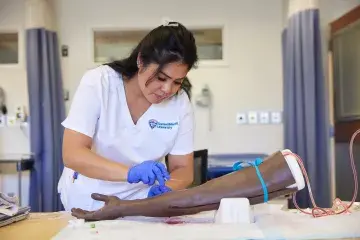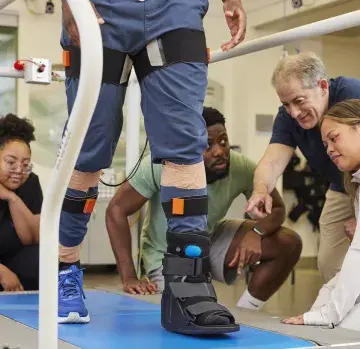Celebrating a 50-Year Career in Occupational Therapy
When Guy McCormack retires from teaching occupational therapy at Samuel Merritt University (SMU) next month and finds more time to paint in his home studio, he’ll be returning to one of the roots of his profession.
“I want to let that part of my brain evolve because I’ve been doing so many left-brain activities for so long,” says Professor McCormack, PhD.
McCormack has been an occupational therapist for 50 years, half of the profession’s history. This year’s celebration of National Occupational Therapy (OT) Awareness Month in April marks its centennial.
Arts and crafts have played a significant role in OT since the field was developed around the idea that participating in an occupation, or doing something with one’s hands, is vital to having a meaningful life.
McCormack, who paints using oils and acrylics, says OT practitioners used the arts to treat mental health problems and rehabilitate hand injuries more often in the past than they do now.
“I think it’s important to have some outlet for expression,” he says.
McCormack’s artistic interests as well as his experience in the Vietnam War inspired McCormack to study occupational therapy.
“I saw a lot of carnage, man’s inhumanity to man,” he says. “I decided I wanted to go into a career where I could help people.”
The therapeutic value of art may also help McCormack because he recently learned that he suffers from a mild case of post-traumatic stress from his experiences in Vietnam. Like other war veterans in the 1960s whose homecomings were marred by the era’s anti-war sentiment, McCormack said he didn’t want to draw attention to his emotional distress.
“I’ve been putting it behind me all these years by keeping so busy with teaching, researching and writing so many papers,” he said.
McCormack started SMU’s Master of Occupational Therapy program in 1994. After leaving for several years to teach at the University of Missouri, he returned to SMU to help develop the Doctor of Occupation Therapy program that launched last year.
“He’s a down-to-earth guy, but his vision is very lofty,” said OT Assistant Professor Beth Ching, who was McCormack’s student at San Jose State University in the 1980s and later became his colleague and longtime office mate at SMU. “He’s always been a visionary in looking at where we’re going in healthcare.”
Ching says McCormack began sharing his knowledge of Eastern medicine techniques in his classes decades ago, long before practices such as acupuncture became mainstream.
“We were studying Western medicine so incorporating alternative medicine was ahead of the curve,” she says. “As an Asian-American student, I was impressed that he was looking at other ways of healing.”
McCormack’s longtime interest in neuroscience led him to research children with autism. With the help of his graduate students, he used neurofeedback training to help increase the children's attention, and improve their behavior and ability to interact with others. Five years after starting the research, McCormack found "statistically significant" improvement in many children after 15 weeks of neurofeedback training.
He also explored the use of computer-assisted interventions to improve memory and cognition in older adults and to help alleviate the mental fog known as “chemo brain” in women who have undergone cancer treatment.
McCormack says his research has helped him understand neuroplasticity, or the brain’s ability to reorganize itself by forming new neural connections in response to learning or following injury.
“I like science and I like art, so I like to pair them up,” he says. “I get motivated by neuroscience and what part of the brain is affected by a particular activity.”
In 2012, McCormack received the Luella Grangaard Political Action Award from the Occupational Therapy Association of California for his advocacy work in promoting the profession among legislators.
He now serves on the executive board of the political action committee of the American Occupational Therapy Association and says he worries about the future of OT if the Trump administration cuts federal healthcare funding and repeals the Affordable Care Act.
After announcing his retirement, McCormack received a resolution from California Assemblymember Rob Bonta that commended him for his accomplishments in occupational therapy and for “the concern and commitment he has displayed for the education of his students.” McCormack will also receive a resolution honoring his career from the office of U.S. Rep. Barbara Lee, D-Oakland, on April 27.


